Kim Hooper's Blog, page 32
December 27, 2017
Books I read in 2017
It’s that time of year again, time to look back at my year of reading. Last year, I read 78 books. This year? 81! You can scan the covers, or peruse the full list below. What were some of your favorite reads of 2017?
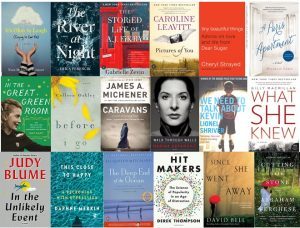
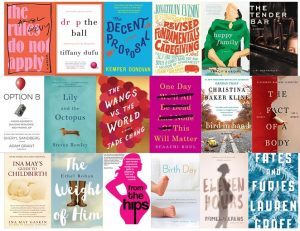
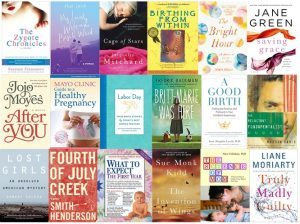
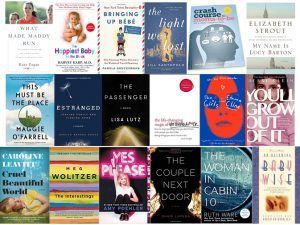
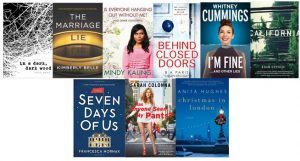
Good ol’ fiction:
The River at Night by Erica Ferencik
The Storied Life of AJ Fikry by Gabrielle Zevin
Pictures of You by Caroline Leavitt
A Paris Apartment by Michelle Gable
Before I Go by Colleen Oakley
Caravans: A Novel of Afghanistan by James Michener
We Need to Talk About Kevin by Lionel Shriver
What She Knew by Gilly Macmillan
In the Unlikely Event by Judy Blume
The Deep End of the Ocean by Jacquelyn Mitchard
Since She Went Away by David Bell
Cutting for Stone by Abraham Verghese
The Decent Proposal by Kemper Donovan
The Revised Fundamentals of Caregiving by Jonathan Evison
Happy Family by Tracy Barone
Lily and the Octopus by Steven Rowley
The Wangs vs. the World by Jade Chang
Bird in Hand by Christina Baker Kline
The Weight of Him by Ethel Rohan
Eleven Hours by Pamela Erens
Fates and Furies by Lauren Groff
Cage of Stars by Jacquelyn Mitchard
Saving Grace by Jane Green
After You by Jojo Moyes
Britt-Marie Was Here by Fredrik Backman
The Reluctant Fundamentalist by Mohsin Hamid
Fourth of July Creek by Smith Henderson
The Invention of Wings by Sue Monk Kidd
Truly Madly Guilty by Liane Moriarty
The Light We Lost by Jill Santopolo
This Must Be the Place by Maggie O’Farrell
The Passenger by Lisa Lutz
The Girls by Emma Cline
Cruel Beautiful World by Caroline Leavitt
The Interestings by Meg Wolitzer
The Couple Next Door by Shari Lapena
The Woman in Cabin 10 by Ruth Ware
In a Dark, Dark Wood by Ruth Ware
The Marriage Lie by Kimberly Belle
Behind Closed Doors by B.A. Paris
California by Edan Lepucki
Seven Days of Us by Francesca Hornak
Christmas in London by Anita Hughes
Nonfiction (memoirs, biographies, essays, pop culture, comedy, true crime; all on audio):
It’s Okay to Laugh (Crying is Cool Too) by Nora McInerny Purmort
Tiny Beautiful Things: Advice on Love and Life from Dear Sugar by Cheryl Strayed
In the Great Green Room: The Brilliant and Bold Life of Margaret Wise Brown by Amy Gary
Walk Through Walls by Marina Abramovic
This Close to Happy: A Reckoning with Depression by Daphne Merkin
Hit Makers: The Science of Popularity in An Age of Distraction by Derek Thompson
The Rules Do Not Apply by Ariel Levy
Drop the Ball: Achieving More By Doing Less by Tiffany Dufu
The Tender Bar by J.R. Moehringer
Option B: Facing Adversity, Building Resilience, and Finding Joy by Sheryl Sandberg and Adam Grant
One Day We’ll All Be Dead and None of This Will Matter: Essays by Scaachi Koul
The Fact of a Body: A Murder and a Memoir by Alexandria Marzano-Lesnevich
My Lovely Wife in the Psych Ward: A Memoir by Mark Lukach
The Bright Hour: A Memoir of Living and Dying by Nina Riggs
Lost Girls: An Unsolved American Mystery by Robert Kolker
What Made Maddy Run: The Secret Struggles and Tragic Death of an All-American Teen by Kate Fagan
Estranged: Leaving Family and Finding Home by Jessica Berger Gross
The Life-Changing Magic of Not Giving a F*ck: How to Stop Spending Time You Don’t Have with People You Don’t Like Doing Things You Don’t Want to Do (A No F*cks Given Guide) by Sarah Knight
You’ll Grow Out of It by Jessi Klein
Yes Please by Amy Poehler
Is Everyone Hanging Out Without Me? (And Other Concerns) by Mindy Kaling
I’m Fine…And Other Lies by Whitney Cummings
Has Anyone Seen My Pants? by Sarah Colonna
Nonfiction (guides on pregnancy/childbirth/parenting… My daughter was born in October):
Ina May’s Guide to Childbirth by Ina May Gaskin
From the Hips by Rebecca Odes and Ceridwen Morris
Birth Day: A Pediatrician Explores the Science, the History, and the Wonder of Childbirth by Mark Sloan
The Zygote Chronicles by Suzanne Finnamore
Birthing From Within: An Extra-Ordinary Guide to Childbirth Preparation by Pam England and Rob Horowitz
Mayo Clinic Guide to a Healthy Pregnancy
Labor Day: True Birth Stories by Today’s Best Women Writers by Eleanor Henderson and Anna Solomon (editors)
A Good Birth: Finding the Positive and Profound in Your Childbirth Experience by Anne Lyerly
What to Expect the First Year by Heidi Murkoff and Sharon Mazel
The Science of Mom: A Research-Based Guide to Your Baby’s First Year by Alice Green Callahan
The Happiest Baby on the Block by Harvey Karp
Bringing Up Bébé by Pamela Druckerman
Crash Course for Moms-to-Be: This is Where Confidence Starts by Alison Bishop
On Becoming Baby Wise: Giving Your Infant the Gift of Nighttime by Robert Bucknam
The post Books I read in 2017 appeared first on Fiction Writing Blog.
December 19, 2017
While you were sleeping: A letter to my daughter
Dear Mya,
You’re napping in your swing, finally. Usually by the time we get you to nap, you need to eat again. I have 10 minutes to write this before the inevitable hunger cry commences.
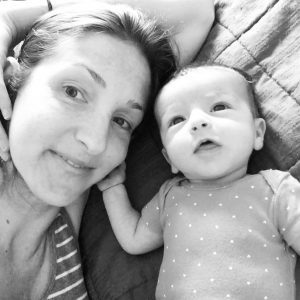 Our first selfie, while watching the ceiling fan. These are the days.
Our first selfie, while watching the ceiling fan. These are the days.It’s been a rough few days. We’ve all had a cold. I got my first round of edits for Cherry Blossoms today. The editor said the manuscript is pretty clean, which is a relief. Still, I can’t bring myself to open the file because I know I won’t be able to start work until we are all feeling better (and, even then, I’ll have to work in 15-minute spurts, whenever you do us the pleasure of napping). Being a parent demands an entirely new brand of patience and creative efficiency.
I’ve also started dusting off another manuscript I had kept in a drawer for a couple years. Much like Cherry Blossoms, this story has always stayed with me and I want to finish it. I feel the need to complete these undone stories so I can write new ones.
The old me would be working feverishly (quite literally right now) all day. This new me takes what she can get. I have to be an opportunist. I do not have the luxury of waiting for perfect moments to write. If a free half hour presents itself, I attack. No hemming and hawing allowed. It’s rather liberating. I realize now how much I used to get in my own way.
So, thank you, for helping me put things into focus. I used to struggle with what my priorities SHOULD be (“should-ing all over the place,” as I like to say). Now, there’s no struggle. It’s all so obvious.
Right on cue, there’s your cry. Here I come.
Love,
Your mom
The post While you were sleeping: A letter to my daughter appeared first on Fiction Writing Blog.
November 30, 2017
Women writing men
My next novel, Cherry Blossoms, has a male narrator. I didn’t plan to write a story with a man’s voice; it just came to me that way. This story, like most of my stories, started with one line: “I have eight months to live.” And the character saying that line in my head just happened to be a guy.
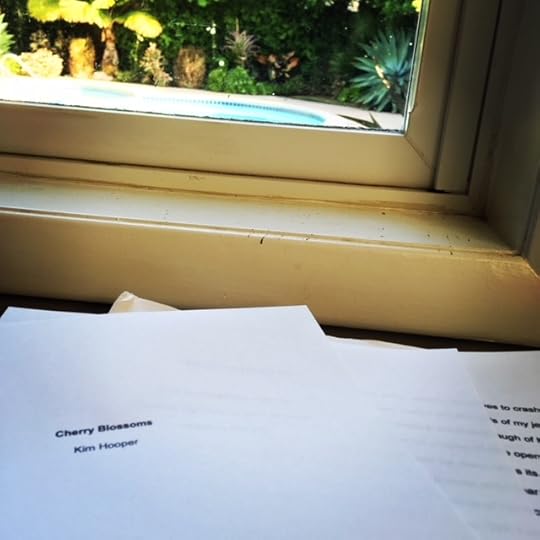
I started this book back in 2009, then set it aside when I got the idea for People Who Knew Me. I never forgot about Cherry Blossoms though. It was always my intention to finish it. But when People Who Knew Me came out, I found myself marketed as a “women’s fiction” writer. This was very much a surprise to me.
When people used to ask me what kind of books I wrote, I said, “General fiction, slice-of-life stories.” I’ve never thought of myself as writing “women’s fiction.” Furthermore, I don’t even know what that means. There is no counterpart, no “men’s fiction.” To me, there is something very problematic about this paradigm. The implication is that a book written by a woman, with a female main character, would appeal only to a woman. In fact, I’ve had many men contact me to say they loved People Who Knew Me. One even said he thought the cover did me a disservice: “There’s a woman on the cover, which makes it seem like this book is only for women, when it’s really a story that would appeal to anyone.”
What’s interesting is that plenty of male authors have female main characters: The Marriage Plot by Jeffrey Eugenides, Little Children by Tom Perrotta, Freedom by Jonathan Franzen, She’s Come Undone by Wally Lamb, to name a few favorites. Of course, these books are not labeled as “women’s fiction.” They are “general fiction,” targeting everyone.
What’s worse, many women who write male characters are told they shouldn’t use their real name, as if they won’t be taken seriously as a woman writing a male voice. JK Rowling’s real first name is Joanne. Her publisher encouraged her to use initials instead of her real name for the Harry Potter books. Also, she writes a series of crime novels with a male main character under the pen name Robert Galbraith. I highly doubt a male novelist was ever instructed to use a female pen name when writing a story with a female main character.
When discussing Book #2, I was told a book with a male narrator would “never fly.” I tried to force some other stories that would fit the “women’s fiction” category, but it just wasn’t authentic. In the end, I wanted to finish Cherry Blossoms. So I did. And then I found a publisher who loved the story as much as I do and didn’t place any importance on the narrator’s gender.
There are some books written by women that feature a male main character. Gillian Flynn’s Gone Girl is probably the most well-known. Donna Tartt (The Secret History, The Goldfinch) writes male main characters very well. What books have you read that feature main characters that aren’t the same gender as the author? Did you take note of this, or did it affect your enjoyment of the story at all?
The post Women writing men appeared first on Fiction Writing Blog.
November 14, 2017
Book #2 is coming!

I am excited to announce that my second novel will be published by Turner Publishing around this time next year!
The book is titled Cherry Blossoms. I started it back in 2009, abandoned it for years, and finished it as part of my 100-day writing challenge a few months ago. I have always loved this story and I never stopped thinking about it. I’m so happy it will finally make its way off my computer and into the world.
More details about the book are coming. For now, I’ll leave you hanging because my baby is crying.
The post Book #2 is coming! appeared first on Fiction Writing Blog.
November 2, 2017
Brave new world
I have been meaning to write a post to let you know that I had my baby but having a baby doesn’t allow much time for things like writing blog posts. At the moment, she is in the swing next to me, awake but content. I am learning to take advantage of these moments.
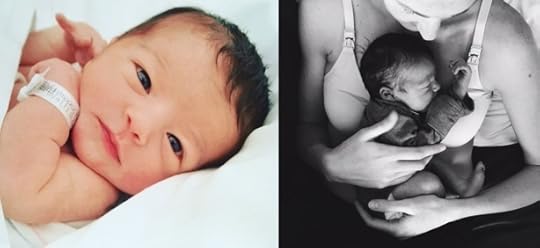
Her name is Mya Jane and she arrived on October 4 to rock my world in the best way possible. I wasn’t sure how I would adjust to this new mom life with very little sleep and personal time. I’ve been pleasantly surprised at how wonderful it’s been. We have had some difficult days, with hours of wailing (the baby, not me…yet…haha), but we have also had some peaceful, joyful days (like today…so far).
I’ve been reading at night while I breastfeed, but I haven’t had time or energy to do any writing. I am hoping to start working on some writing in a month or two–as she sleeps more at night and takes more consistent daytime naps. For now, I am enjoying these newborn days and watching a ton of bad TV. My brain cells will regenerate, right?
The post Brave new world appeared first on Fiction Writing Blog.
September 24, 2017
Motherhood and writing
I’m 37 weeks pregnant, so I’ve been doing a lot of thinking on this subject. How will being a mom affect my writing? I know I will have way less time and will need to learn to maximize free moments even more than I do now. But, beyond schedule and logistics, will the stories I’m drawn to change? Will the kinds of characters I write change? I’m really excited to find out.
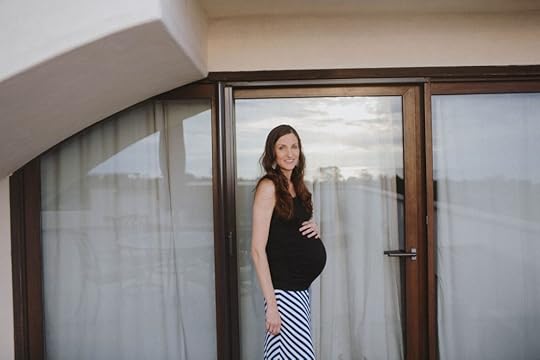
A week ago, The Atlantic published an article on the topic of motherhood and creativity, saying, “Cultural messages tell women that making art and having children are incompatible pursuits. But science suggests that women may become more creative after having kids.”
The article starts by talking about new-mom rats, whose behavior changes dramatically as they adjust to their new roles:
“Even as her offspring grow and learn to fend for themselves, the neurological changes of motherhood persist. She will experience less memory decline in old age, and have quicker navigation skills than non-mothers, outsmarting them in mazes. She is more efficient, making fewer errors. She finds new and unusual ways to get tasks done—problem-solving approaches she had not considered before giving birth.”
It seems to be true that “whether rodent or human, a mother’s brain requires cognitive, emotional, and behavioral flexibility.” That type of thinking outside the box is the very definition of creativity.
Before my sister had kids, she was known for what my mom calls “piddling away a day.” She wasn’t very organized. She moved through life somewhat slowly. Then she became a mom–three times over. Now, she is a multitasking champion. She runs a thriving business while raising her boys and scheduling photography sessions in her “free time.” She doesn’t “do it all” perfectly, but I can say that being a mom has made her the best version of herself. And she is infinitely more creative and driven as a mom.
Anna Abraham, a professor who studies the neuroscience of creativity, says, “Being a mother gives you a different perspective. You’re dealing with a wholly novel situation. You’re discovering a side of yourself that is completely new. All of this could be useful to creativity–which is about novelty.”
I know this: I’ve written quite a bit during my pregnancy, despite the queasiness and fatigue. And, while I’ve had moments of mental fogginess (“pregnancy brain”) over the past several months, I’ve also had moments of feeling weirdly on top of it. I feel like I’m mentally preparing for what’s ahead, organizing and nesting and all that good stuff. I feel more “on,” more driven. But what will happen when the baby is actually here?
In one of my baby prep classes, the instructor showed us illustrations of a mother’s brain before having a child, and then after. Predictably, once becoming a mom, a large chunk of space previously dedicated to other things becomes totally occupied with the baby. This makes sense. It’s nature’s way of ensuring the baby thrives. But, I have to believe that, over time, the mom thrives too (as evidenced by women like my sister).
Artist Hein Koh says, “I always have a million ideas I’m thinking about, and when I’m with my kids, a moment of inspiration will strike, and I will file it away.” When she gets to her studio, she says, “I feel like I can’t get my ideas out fast enough. Sometimes it causes me pain to leave. At the same time, I love going home to my family, switching gears and going into mom mode–it helps normalize me.”
I’ve found that, in general, I do my best writing when I’m busy. The shifting of gears between different priorities keeps the neurons firing. Plus, when I’m tending to other things, my subconscious can get to work on a plot or character problem. It’s always a good thing when I have to abandon a writing project to do something else because I come back to the writing project excited (and often with solutions to those plot and character problems). Absence, as they say, makes the heart grow fonder.
There will never be enough time to do all the writing I want to do. That’s the reality now, and I assume that feeling will intensify when the baby is here. But, I think writing will be sweeter in a way when I have less time for it. I will feel more of the urgency that Koh describes, more of that need to create that can sometimes fade when I get too up in my head about it, overanalyzing it until it feels more like an obligation than a joy. I won’t have time to get up in my head about it. In those rare free moments, I’ll only have time to do, to write.
If you are a mom and a writer, what are your thoughts?
The post Motherhood and writing appeared first on Fiction Writing Blog.
August 29, 2017
100-day writing challenge: Complete
Annnnd, just like that, 100 days have passed.
When I started this thing, my intention was to write every single day for 100 days. After all, that’s what I did when I undertook this challenge back in 2013. This time, I wasn’t as strict. I used the challenge more to motivate me to stick to writing “in general” throughout the 100 days. I didn’t write every single day; but I was in a writing mindset for the whole time, if that makes sense. In other words, writing moved up several spots on my list of priorities.
Over the last 100 days, I committed myself to revisiting an old novel I abandoned years back and finishing it–finally! I’m happy to say I’m nearly done. I’ve managed to summarize the loose ends I need to tie on one Post-it. ONE. There are a few passages I need to add. And I need to finesse the ending. Then I’ll let it sit for a while before giving it another read (during which I’ll find more fixes, inevitably). That tends to be how I work.
Over the last 100 days, I also wrote a brand new short story and revised a few old ones. I submitted to some publications, which is truly like pulling teeth for me.
All in all, it felt good. I’m one of those writers who does well with structure. I’d love to be able to say I write “when the inspiration strikes,” but if I waited for that, I’d never get anything done. Life is just too busy. I usually find inspiration once I open a Word document and start writing. Even if I think I’m not in the mood, I get in the mood after a few sentences. Sometimes, all it takes is just committing to reading back over what I wrote the day (or week) before. That tends to lead to revising or new writing.
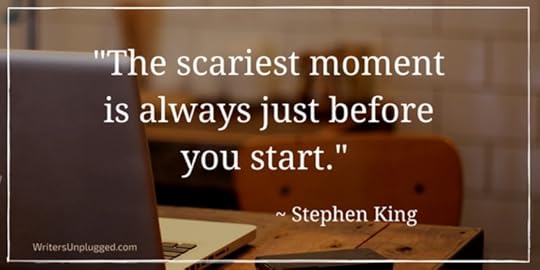
So, what now? Well, I’m due to have a baby in 6 weeks, so I’m not setting any expectations about writing. I assume I’ll be tired in these last weeks of pregnancy, and focused on getting ready for the little one. I admit I’m curious to see how motherhood will affect my writing. On the one hand, I’ll have less time; on the other, I’ll have much more to write about. That’s the thing about writing–it’s so influenced by life. The stories I want to write a year from now will be different than the stories that interest me today.
My sister is a well-known blogger and photographer (you can check out her blog here), and she was saying how writing and taking photos help her reflect back. Sometimes, life in the moment isn’t pretty, but hindsight allows for appreciation of all those “ugly” moments. That’s why I write, too–to put things in perspective, to define experiences, to make sense of chaos. I’m looking forward to the new chapters as a mom. These next 100 days are going to be wild.
The post 100-day writing challenge: Complete appeared first on Fiction Writing Blog.
August 3, 2017
The daunting first draft
One of the goals of my 100-day writing challenge has been to finish the first draft of a novel I started and abandoned years ago.
This project is a bit different than most first-draft-projects because I’m not starting with the blank page; instead, I’m wading through old work and editing, cutting, adding as appropriate. Still, the feelings that come up in this process (the doubt, anxiety, etc) are all very standard for a first draft. It’s both exciting and scary to work in a bubble (and most first drafts are, and should be, written in a bubble). Every day, I think, “What am I doing? Nobody is going to read this!” I decided to see what authors say about the infamous first draft to verify that these feelings are normal (spoiler alert: They are).
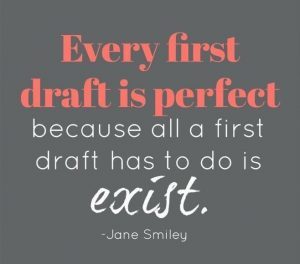
***
“For the first draft I need to know only enough to keep going. No more, no less.”
–Antoine Wilson
***
“It was a huge struggle. I’m not quite sure why I suffered to the degree I did while working on that book, but I do know that my work up to that point had been fairly conventional, and I didn’t know if anyone would accept this kind of book from me. It was almost as if I thought I’d be punished for it. I felt afraid as I worked on it. I thought it was terrible, that I was reaching too far.
At the same time, some of the most exciting moments I’ve had as a writer were during the writing of that book, even with all those worries and that feeling of doom. One day I read the first six chapters of the book in one sitting, and I tore out of the house and went running, and I had this sense that I’d never read anything quite like that before, that I’d done something really different. That was such a thrilling feeling — a rarity as I was working on it.”
–Jennifer Egan, on writing Look at Me
***
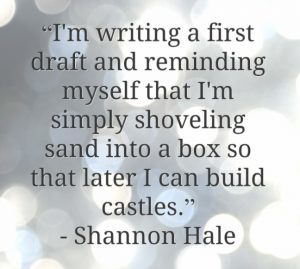
***
“My opinion is that you want to figure out character and plot in the first draft. I think it’s also a good idea to have the setting nailed down in the first draft, if possible; moving the narrative to another location can entail some pretty tedious rewrites. It’s also a good idea to figure out whether the book’s going to be in the first person or the third person as early on as possible, because changing pages and pages of text from one to the other is an insanely labor-intensive process.
My feeling is that you don’t need to waste your time obsessing over pacing in the first draft, because that’s the kind of thing that can change completely in revisions. In your first round of revisions you’ll inevitably end up cutting a lot of material, and that will change the pace of the book, so I think pacing is something best refined toward the end of the process.”
–Emily St. John Mandel
***
“I think almost nothing is worth sweating in the first draft. Does a character need to change genders? Do you want to shift the structure? Just do it, and keep moving forward. Finishing a draft of a novel is so hard, and so enormous, that one needs all the momentum possible. If you stop and go back to the beginning every time you want to change something, you will never finish. Just go go go! You will have the time to go back and fix all your mistakes, right your wrongs, etc. Just get to the end of the first draft. The feeling of accomplishment is sweet enough to spur you on to make even the most major changes in revision.”
–Emma Straub
***
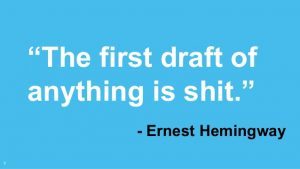
***
“In the first draft I’m just trying to figure out what the story is or might be. I’m trying to learn the story, and trying to stay open to the possibilities that the original idea might be capable of generating. The only way to learn the story is by writing it, but how do you write it when you have only the vaguest notion of what the story is, and who the characters might be? That’s a problem. The problem, eh? The only way I learn it is by writing it line by line, page by page.
My expectations for first drafts are pretty low. I don’t worry about polishing the language at all, or fine-tuning character or plot. I’m basically just trying to figure out what the story might be.”
–Ben Fountain
***
“There’s a huge gap between what I need to know and what I do know when I begin a novel. If I waited until I knew at least thirty percent of what I should know before diving in, I think I’d be permanently stuck on the springboard. Normally (and I’m talking from the experience of a meager two books here) I know two things: a place and a person. The place is usually vivid. I could go on about it for pages. But the person is a cardboard cut out—two dimensional. Magician. Musician. Drunk. Shopkeeper. What I have to force myself to figure out is a single incident that sets the story in motion. It might be removed later on, but I need to pick one action which might cause this person to move about this place. Since I know so little about my character(s) when I first commit them to paper, I tend to overwrite them, cramming all sorts of overblown background detail into my first draft, which in turn drags down what little plot I initially have. My second draft is all about fixing that balance, pruning the obsessive background information and replacing it with more action in the novel’s present.”
–Ivy Pochoda
***
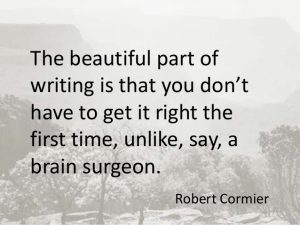
***
“For me, the first draft is really just a big mud-rolling, dust-kicking, mess-making time in which my only job is to find the story’s heartbeat. I allow myself to invent characters without warning, drop them if they prove to be uninteresting, change the setting in the middle, experiment with point of view, etc. I figure that the body will grow up around the heart, that it’s always possible to bring all the various elements up and down, sculpt and polish, as long as I’ve got something that matters to me. The second draft (and the 3rd through 20th, Lord help me) involves getting out the tool belt and thinking like a carpenter. But the first draft is all dirt and water and seeds and, hopefully, a little magic. Of course, this method means that my first draft is almost unreadable. Maybe someday I’ll invent a way of making a slightly cleaner mess, but until then, I try to enjoy the muck.”
–Ramona Ausubel
***
Ultimately, as daunting as first drafts can be, I’ve learned to enjoy them because the farther you get into the writing (and publishing) process, the more feedback you get from others, the less the book can feel like “yours.” In those beginning phases, it is completely yours.
Like Ben Fountain says above, you have the luxury of keeping expectations low with the first draft. Don’t fret too much about the exact language. Feel free to take the story in unplanned directions. Just enjoy getting the story OUT. If you get too in the weeds on the first draft, you’ll get overwhelmed and risk giving up. Trust that you’ll have time later to figure out nuances. There will be edits–so many edits. At some point, you will look back on the early days with a nostalgic smile, so try to enjoy those days while you’re in them.
The post The daunting first draft appeared first on Fiction Writing Blog.
July 19, 2017
Day 60 of the 100-day writing challenge
I meant to do a halfway-there post on my 100-day writing challenge, but I forgot. So, here I am, 10 days late, to say it’s going well. The last time I did a challenge like this, I was very neurotic about writing every single day (since that was, after all, the point of the whole thing). If I was at the end of the day and hadn’t written anything, I would take out my trusty stack of post-its and jot down some ideas, just so that day “counted.” I haven’t been that neurotic this time. There have probably been at least 10 days when I haven’t written anything at all. But, I still consider this challenge a success so far. Why? Because I’ve thought about my writing every day. And I’m making progress on projects. Sometimes, just setting a goal is enough to get moving.
I’m working on a novel that I started years ago and then abandoned. I have no idea if it will ever make its way into the world, published, but I am trying not to concern myself with that (the struggle is real). I have about 300 pages. Granted, I had written many of those pages years ago, so this has been mostly an editing endeavor, with some new writing here and there. I want to see it through. I have this habit of starting novels and then abandoning them. It will feel good to finish all my partly-finished novels, one at a time. Then I’ll start something totally new.
I’m also working on a collection of short stories. Some of the stories are new, some are old. I thought I would look back on old stories and cringe, but a few are decent. I’ve always wanted to polish my stories, so it’s nice to set aside some time to do that.
I have a memoir I’m tinkering with as well. I was actively writing it for a while, but it’s been in the background for a few months now. I add notes to it whenever something crosses my mind. I have about 200 pages written, along with several pages of notes. It’s not the right time to “finish” the memoir, if that makes sense. Some life things need to unfold. I feel confident about letting that one be for now. It’s chilling on the back burner.
My goal over the next 40 days is to finish the novel and polish a handful of short stories.
And now I leave you with a couple quotes I came across recently and love:
“The deepest purpose of reading and writing fiction is to sustain a sense of connectedness, to resist existential loneliness.” — Jonathan Franzen
And this one:
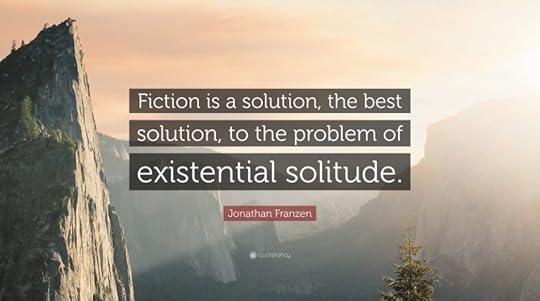
The post Day 60 of the 100-day writing challenge appeared first on Fiction Writing Blog.
July 7, 2017
The psychology of writer’s block
Recently, I read this Writer Unboxed piece by Julianna Baggott that asks, “Is writer’s block a form of self-protection?” I’m always intrigued by theories that writer’s block is something other than laziness (because that’s what the mean “YOU MUST WRITE” voice in my head tells me it is).
Baggott suggests that writer’s block isn’t “failure.” She writes:
“There are times when writing – the time and space for self-expression – seems dangerous and/or frivolous. There are times when a writer is overwhelmed with life, maybe even trauma or profound grief, when the page is impossible. The writer, recently reeling from a difficult experience, can be too vulnerable to open up. The writer can be so necessarily focused on survival that writing can’t be rationalized…Writer’s block can happen when the need for self-protection is stronger than the need for self-expression.”
This makes sense to me, but I think there are non-traumatic times when writing doesn’t happen, too. What’s going on then?
Baggott writes about a friend of hers who decided to stop writing years ago and claimed not to miss it. Suddenly, one day, he told his therapist that he felt like writing–“an old desire bubbling up.” What sense could be made of all those years spent not writing?
Baggott explains:
“One of the refrains this writer seemed to tell himself was that he didn’t want to write; and if he didn’t want to write, he didn’t have to be disappointed when he couldn’t write, due to his busy life. If he didn’t want to write, he didn’t have to send his work out and get rejected. Writing was dangerous and so was simply wanting to write. He didn’t identify with the term writer’s block because he wasn’t blocked. He wasn’t blocked because he didn’t want. He was safe inside of that rationale for a long time. But once he dealt with other things, he didn’t need to be safe. He felt that he could allow risks on the page and in the business of writing, too.”
The psychology of it is this: “When the inner critic tells the writer that the work isn’t good enough so don’t even try, the critic is trying to protect the vulnerable part of the writer from being activated by a fear of failure. The writer needs to thank that voice for its concern and then reassure the critic that the warning, though well-intentioned, is unnecessary. The writer needs to make it clear that he can write and will survive.”
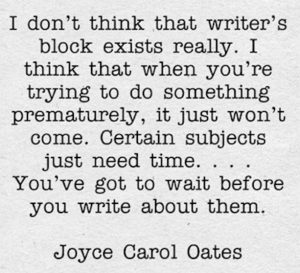
What I take from this is that it’s normal to recoil sometimes. There’s no point in attaching judgment to it. Life hardships are sometimes to blame. Other times, the “block” stems from the writer’s need to gather his/her strength in the face of self-criticism and doubt. The writer needs to feel safe before it’s possible to create authentic stories.
As Baggott writes:
“Once self-protection is no longer the order of the day, the need for self-expression can come to the fore. But here’s the thing. The need for self-expression was there all along – trying to be good, trying to be a quiet engine, hushing its own want, pacing the ribcage like something that’s only truly alive when allowed to be feral. It’s our job to unlock the cage, to sniff the air for danger – yes, of course – but then, let loose, to roam.”
The post The psychology of writer’s block appeared first on Fiction Writing Blog.



